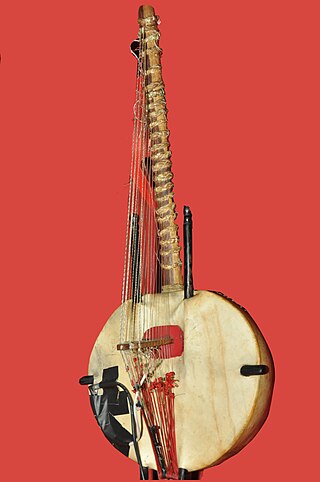
The kora is a stringed instrument used extensively in West Africa. A kora typically has 21 strings, which are played by plucking with the fingers. It combines features of the lute and harp.

The balafon is a gourd-resonated xylophone, a type of struck idiophone. It is closely associated with the neighbouring Mandé, Senoufo and Gur peoples of West Africa, particularly the Guinean branch of the Mandinka ethnic group, but is now found across West Africa from Guinea to Mali. Its common name, balafon, is likely a European coinage combining its Mandinka name ߓߟߊ bala with the word ߝߐ߲ fôn 'to speak' or the Greek root phono.
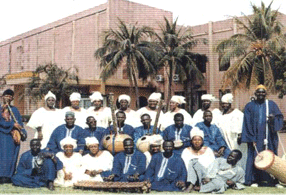
The music of Mali is, like that of most African nations, ethnically diverse, but one influence predominates: that of the ancient Mali Empire of the Mandinka. Mande people make up around 50% of Mali's population; other ethnic groups include the Fula (17%), Gur-speakers 12%, Songhai people (6%), Tuareg and Moors (10%).

A griot is a West African historian, storyteller, praise singer, poet, and/or musician.

Fanta Damba is a Malian djelimuso known to her fans as La Grande Vedette Malienne. Damba was a successful Mali musician born into the Jeli family, who are often called Griots. She began singing as a child while being surrounded by a family full of musicians. Damba began recording in her early twenties with Radio Mali. Fanta was one of Mali's most famous women from 1960 to 1970. In 1975, she became the first djelimuso to tour Europe solo and was also known for performing at the Mali national ensemble performance of the African Festival of Arts and Culture held in Lagos in 1977. She was rewarded for her talent by being named as a Ngara, which usually recognizes one as being a master musician. Many musicians aspire to be a Ngara, but very few held the title. In order for a Griot to be recognized as a Ngara, one must be considered to possess great courage, are skilled, experienced, disciplined and are a successful musician usually over the age of forty. It is considered a gift that most musicians are recognized as having at an early age. A Ngara also usually has a strong middle tone voice that can control the crowd with emotions. Mali women such as Fanta were known for their praise singing and did not play a variety of instruments unlike the men. She inspired other famous Mali musicians such as Yousou NDour, who went to visit Fanta and was so taken away by her music that he was inspired to write the song Wareff in relevance to Fanta's song Djadjiri. Female Mali musicians typically received more attention and gifts such as cars, houses, jewelry, and gold than male Mali musicians. They were represented through the media, concerts, markets, and were perceived as the stars. Fanta retired as a performer in 1985.
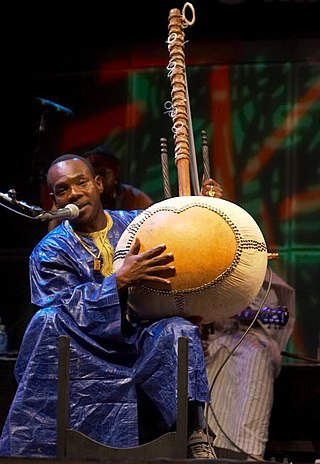
Toumani Diabaté is a Malian kora player. In addition to performing the traditional music of Mali, he has also been involved in cross-cultural collaborations with flamenco, blues, jazz, and other international styles. In 2006, the London-based newspaper The Independent named Diabaté one of the fifty best African artists.
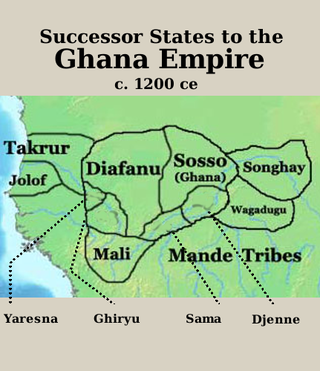
Soumaoro Kanté was a 13th-century king of the Sosso people. Seizing Koumbi Saleh, the capital of the recently defunct Ghana Empire, Soumaoro Kanté proceeded to conquer several neighboring states, including the Mandinka people in what is now Mali. However, the Mandinka prince Sundiata Keita built a coalition of smaller kingdoms to oppose him at the Battle of Kirina, defeating the Sosso and leaving Sundiata's new Mali Empire dominant in the region.
Sunjata [] is an epic poem of the Malinke people that tells the story of the hero Sundiata Keita, the founder of the Mali Empire. The epic is an instance of oral tradition, going back to the 13th century and narrated by generations of griot poets or jeliw (djeli). There is no single or authoritative version. Material pertaining to the epic first began to be collected during the early 20th century in French Sudan, notably by the French elite school École William Ponty, resulting in the "modern" version of the tale as considered standard today, as published in "novelistic" form in French translation by Djibril Tamsir Niane in 1960.

Kouroukan Fouga, or Kurukan Fuga, was the constitution of the Mali Empire created after the Battle of Krina (1235) by an assembly of nobles to create a government for the newly established empire, according to the Epic of Sundiata. According to oral tradition of the griot poets of Mali and Guinea, the Kouroukan Fouga established the federation of Mandinka clans under one government, outlined how it would operate and established the laws by which the people would live. The name Kurukan Fuga is a toponym, translating to "clearing on granite/lateritic rock", referring to the plain near the town of Ka-ba where the narrative has Sundiata Keita present the charter.

Baba Sissoko is a percussionist from Mali.

Articles related to Mali include:

The ngoni is a string instrument and a traditional West African guitar. Its body is made of wood or calabash with dried animal skin head stretched over it. The ngoni, which can produce fast melodies, appears to be closely related to the akonting and the xalam. This is called a jeli ngoni as it is played by griots at celebrations and special occasions in traditional songs called fasas in Mandingo. Another larger type, believed to have originated among the donso is called the donso ngoni. This is still largely reserved for ceremonial purposes. The donso ngoni, or "hunter's harp," has six strings. It is often accompanies singing along with the karagnan, a serrated metal tube scraped with a metal stick. The donso ngoni was mentioned by Richard Jobson in the 1620s, describing it as the most commonly used instrument in the Gambia. He described it as an instrument with a great gourd for a belly at the bottom of a long neck with six strings.

The Prayer Cycle is a choral/orchestral album by American film and television composer Jonathan Elias. The album was released by Sony Classical Records in the United States on March 23, 1999.
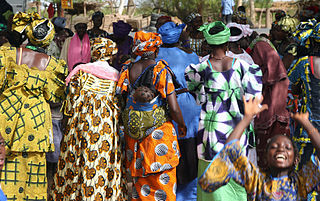
The culture of Mali derives from the shared experience, as a colonial and post-colonial polity, and the interaction of the numerous cultures which make up the Malian people. What is today the nation of Mali was united first in the medieval period as the Mali Empire. While the current state does not include areas in the southwest, and is expanded far to the east and northeast, the dominant roles of the Mandé people is shared by the modern Mali, and the empire from which its name originates from.
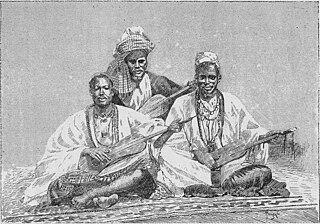
Circa 1230s-1600s, the MaliEmpire was created in Western Africa along the Niger River. Often associated with being founded by Sunjata Keita, the history of Mali is extremely based on oral history. The story of the founder of Mali, Sunjata Keita, is largely based on oral history. Oral history may be defined as the preservation and interpretation of historical, cultural or personal experiences by way of a speaker. In Mali, such a speaker can be described as a poet, a storyteller, a praise singer or a musician. A large amount of Mali's history is transferred via oral historians. Such oral historians in Mali are known as griots, Jalis, and Jelis. The origins of oral history in Mali may be traced back to the story of Sunjata Keita. Modern-day oral history in Mali has transformed from the history based griots to a more contemporary musical and negotiator based griots. The current state of oral history in Mali has travelled to other realms like popular culture and politics.
Mamadou Sidiki Diabaté is a prominent Mandé kora player and jeli from Bamako, Mali. He is the 71st generation of kora players in his family and a son to Sidiki Diabaté.

Red Earth is a 2007 studio album by Dee Dee Bridgewater. It carries the subtitle "A Malian Journey" to celebrate and explore her African and Malian ancestry. The album brought her the seventh nomination for Best Jazz Vocal Album at the 2008 Grammy Awards. On Billboard's Top Jazz Album chart it reached Number 16.

Trio Da Kali is a griot music group from Mali constituted of three members: Hawa Kassé Mady Diabaté (vocals), Lassana Diabaté (balafon) and Mamadou Kouyaté (ngoni). Hawa is the daughter of a griot Kassé Mady Diabaté. The latter is the son of the ngoni master Bassekou Kouyate.
Kassé Mady Diabaté was a Malian singer, musician and griot. His soft and particular voice with deep undertones – an atypical characteristic for a griot – earned him the nickname "The golden voice of Mali". He is considered, together with Salif Keita, as one of the greatest Mandinka artists of his generation.















